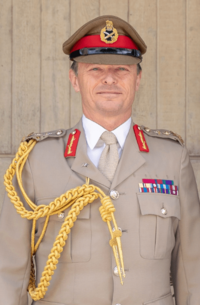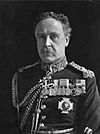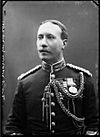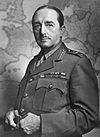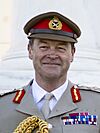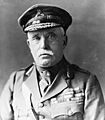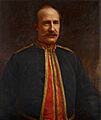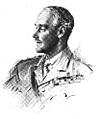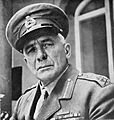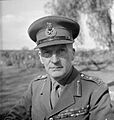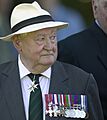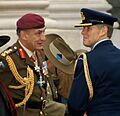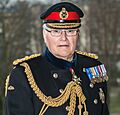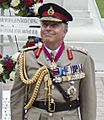Chief of the General Staff (United Kingdom) facts for kids
Quick facts for kids Chief of the General Staff |
|
|---|---|

Flag of the CGS
|
|
| Ministry of Defence British Army |
|
| Style | General |
| Abbreviation | CGS |
| Member of | Defence Council Army Board Chiefs of Staff Committee |
| Reports to | Chief of the Defence Staff |
| Nominator | Secretary of State for Defence |
| Appointer | The Monarch
On the advice of the Prime Minister, subject to formal approval by the King-in-Council
|
| Term length | No fixed length |
| Precursor | Commander-in-Chief of the Forces |
| Formation | 1904, 1964 |
| First holder | Sir Neville Lyttelton |
| Deputy | Deputy Chief of the General Staff |
The Chief of the General Staff (often called CGS) is the top military leader of the British Army. Think of them as the main boss who makes sure the Army is ready and strong. This important job has been called CGS since 1964.
Before 1964, the title was Chief of the Imperial General Staff (CIGS). The CGS works closely with other top military leaders. They are part of groups like the Chiefs of Staff Committee and the Army Board. These groups help make big decisions for the entire British military.
The CGS also reports to the Chief of the Defence Staff. This person is the overall head of all the British Armed Forces, including the Army, Navy, and Air Force.
Currently, the Chief of the General Staff is General Sir Roland Walker. He took on this role on June 15, 2024, following General Sir Patrick Sanders.
Contents
What the Chief of the General Staff Does
The Chief of the General Staff (CGS) has many important duties. They are in charge of making sure the Army is strong and ready for anything. This includes both regular soldiers and reserve forces.
Here are some of their main responsibilities:
- Leading the Army: The CGS is responsible for all Army personnel. They make sure everyone is working well together.
- Keeping the Army Organized: They ensure the Army runs smoothly and efficiently.
- Chairing Important Meetings: The CGS leads key meetings, like the Executive Committee of the Army Board. These meetings help guide the Army's future.
- Giving Expert Advice: They provide special advice on Army matters to higher government officials. This includes the Secretary of State for Defence and the Prime Minister.
- Planning for the Future: The CGS helps develop new ways for the Army to operate. They also decide how resources are used.
- Managing the Army Team: They lead the senior leaders of the British Army.
History of the Role
The title "Chief of the General Staff" was first used for a short time between 1904 and 1909. During this period, General Sir Neville Lyttelton and Field Marshal Sir William Nicholson held the position.
Then, in 1909, the title changed to "Chief of the Imperial General Staff" (CIGS). This name was used for many years. In 1964, it changed back to "Chief of the General Staff" (CGS), which is what it is called today.
Throughout its history, the person holding this job has always been the main military member of the Army Board.
| Royal Navy | British Army | Royal Air Force | Combined | |
|---|---|---|---|---|
| 1645 | N/A | Commander-in-Chief of the Forces (1645/60–1904, intermittently) | N/A | N/A |
| 1689 | Senior Naval Lord (1689–1771) | |||
| 1771 | First Naval Lord (1771–1904) | |||
| 1904 | First Sea Lord (1904–1917) | Chief of the General Staff (1904–1909) | ||
| 1909 | Chief of the Imperial General Staff (1909–1964) | |||
| 1917 | First Sea Lord and Chief of the Naval Staff (1917–present) | |||
| 1918 | Chief of the Air Staff (1918–present) | |||
| 1959 | Chief of the Defence Staff (1959–present) | |||
| 1964 | Chief of the General Staff (1964–present) |
How the Chief Leads the Army
The Chief of the General Staff is responsible for leading the entire British Army. For example, during World War II, General Alan Brooke, who was the CIGS at the time, focused on big-picture strategies. He worked with American leaders to plan how the Allied forces would fight.
The Chief also decides who gets promoted to senior commander roles. They help manage where soldiers are sent and what equipment they need. They also make sure that air forces work well with ground troops. General Brooke was known for trusting his deputies with tasks. He also worked well with the government officials in charge of the War Office.
People Who Have Held the Role
Many important military leaders have served as the Chief of the General Staff or its earlier versions. Here are some of the people who have held this significant position:
| No. | Portrait | Name | Took office | Left office | Time in office | Ref |
|---|---|---|---|---|---|---|
| Chiefs of the General Staff (1904-1909) | ||||||
| 1 | General Sir Neville Lyttelton (1845–1931) |
12 February 1904 | 2 April 1908 | 4 years, 50 days | ||
| 2 | Field Marshal Sir William Nicholson (1845–1918) |
2 April 1908 | 22 November 1909 | 1 year, 234 days | ||
| Chiefs of the Imperial General Staff (1909-1964) | ||||||
| 2 | Field Marshal Sir William Nicholson (1845–1918) |
22 November 1909 | 15 March 1912 | 2 years, 114 days | ||
| 16 | Field Marshal Alan Brooke, 1st Viscount Alanbrooke (1883–1963) |
25 December 1941 | 25 June 1946 | 4 years, 182 days | ||
| 22 | General Sir Richard Hull (1902–1989) |
1 November 1961 | April 1964 | 2 years, 5 months | ||
| Chiefs of the General Staff (since 1964) | ||||||
| 22 | Field Marshal Sir Richard Hull (1902–1989) |
April 1964 | 8 February 1965 | 10 months | - | |
| 41 | General Sir Mark Carleton-Smith (born 1964) |
11 June 2018 | 13 June 2022 | 4 years, 2 days | ||
| 42 | General Sir Patrick Sanders (born 1966) |
13 June 2022 | 15 June 2024 | 2 years, 2 days | ||
| 43 | General Sir Roland Walker (born 1970) |
15 June 2024 | Incumbent | 1 year, 251 days | ||
Images for kids
See also
- Chief of the Defence Staff
- First Sea Lord / Chief of the Naval Staff
- Chief of the Air Staff
- Deputy Chief of the General Staff
 | William L. Dawson |
 | W. E. B. Du Bois |
 | Harry Belafonte |


